(DGR reviews the new album by the now-larger-than-life Greek black metal band Rotting Christ, which is being released today by Season of Mist.)
If at this point in their career Rotting Christ have decided to be the AC/DC of anti-religious heavy metal then I am all for it, even if it just boils down to me having an easier time explaining why I enjoy the songcraft that the band have been up to for so many years now.
To say that they’ve found a sound would be putting it politely; Rotting Christ not only found a sound, but they also basically defined it and then later let it define them. Especially in more recent years they have basically shifted from being a fire-fueled black metal nightmare into an almost Hollywood-esque war-drums-and-all hybrid of martial rhythms, ’70s prog guitar influences, and the straightforward guitar stomp and lead work that has made them so insanely catchy over the years. The group’s latest disc, The Heretics, is a giant block of that specific sound.
Arriving three years after the release of the group’s previous album, Rituals, The Heretics feels like Rotting Christ‘s career summed up so far. As you travel through the album’s ten songs it’s hard not to hear constant callbacks through the past decade-plus of the band’s work, or even more immediate comparisons to specific songs from albums like AEALO and on. The Heretics is also a more straightforward album than its predecessor. Whereas Rituals aimed to sound like ten different songs, ten different rituals, the overall experience wound up all over the place, yanking listeners from one segment to the next. The Heretics is as Rotting Christ as it could be, ten songs that find a blueprint very early on and then hew very closely to it for the entirety of the album’s forty-plus minutes.
That sense of familiarity permeates just about every aspect of The Heretics. As you journey through the album you’ll often find yourself thinking that this is Rotting Christ firmly in their comfort zone, war drums and all. Depending on where you fall on Rotting Christ‘s sound as it has crystalized over the past four releases, you’ll know almost immediately where you’ll fall on The Heretics. I have enjoyed the group’s evolution into this sort of larger-than-life, titanic paradigm of martial prowess turned black metal.
The numerous mid-tempo songs and stomping pace at which Rotting Christ write their music has seemed to hold endless appeal — the fact that they are also criminally underrated as melodic lead guitar writers being a huge bonus. The band have mastered the art of “guitar riff as weapon” by this point, and, as mentioned before, have absolutely zero issue heading back to that well across The Heretics‘ ten songs.
I was absolutely thrilled at the presence of a song like “Fire, God, and Fear” — which shares similar tempo and songwriting structure to the song “Grandis Spritus Diavolos” before it from the album Kata Ton Daimona Eaytoy, to such a point that it is practically a spiritual sequel. And it is also the second song on The Heretics to follow the naming format of “Thing, Thing, and Thing”. The first in this case being the glorious “Heaven and Hell And Fire”, one of a small collective of songs that features some stellar melodic lead work that seems to dance entirely around the group’s traditional “Thud, Thud, Thud…Thud” drumming backbone.
Two others that could easily be grouped into that collective would be immediate follower “Hallowed Be Thy Name” and “The New Messiah” later on in the album, both of which lean heavily on the chanted vocals to augment the band’s assault. In fact, “Heaven And Hell And Fire” could be viewed as a bridge between the two songs, style-wise, were it not so early on in the album.
In spite of that comfort zone standard that The Heretics wears so proudly, there are a couple of genuine surprises – – one of which is at the closing of the album and caused me to do a double-take so hard, based on its lyrical content alone, that I might still be suffering from a minor case of whiplash from the first time I had heard it. Released as one of the lead singles ahead of the release, album closer “The Raven” is the one that caught me off guard the most (this is the second time that one of the more surprising songs on a Rotting Christ disc comes at the very end).
Like Anaal Nathrakh, Rotting Christ are a perhaps surprisingly studious and literary band, and Sakis Tolis certainly has his favorite authors and passages to cite. You can reliably expect something from the likes of Voltaire and William Blake (twice! across three discs!), but Rotting Christ using Edgar Allen Poe‘s famous work “The Raven” as inspiration for a song was certainly enough to turn my head, especially as the music is a pretty straightforward and heavy Rotting Christ track. Yet, hearing the band invoke the line “Quoth the Raven, Nevermore!” in the song — and pretty blatantly too (there’s a lot of limelight placed on that particular passage) — was still enough to hold one’s attention as The Heretics rumbled to its close.
“The Voice Of The Universe” was the other surprise, if only just because, somehow, in the midst an album that feels like Rotting Christ‘s previous releases concentrated onto one disc, it is a song that sounds like the whole of The Heretics condensed down into one track. Not only is it nearly the same run-time as “The Raven” at a little over five minutes and twenty seconds, but the thundering drums, chanted vocals, and glorious guitar leads interwoven throughout the whole song feel like every writing standard that Rotting Christ have carved out for themselves so far, all brought into play in one song. By condensing so much of their already working formula, Rotting Christ effectly trim whatever fat may be left in their style into one sleek beast that makes full usage of every minute that it asks of you. It even manages to invoke the spirit of “Heaven And Hell And Fire” from the same album for one of the craziest moments of deja vu in music out there.
Like Amon Amarth before them, Rotting Christ have joined a handful of esteemed groups who have gotten scarily good at writing music where you can geniunely shuffle up their whole discography and have a consistently good time. Revocation and Skeletonwitch, for example, are two others that have pretty sizeable song collections that can be mixed up into hours’ worth of endlessly catchy and consistently good guitar assaults. The Heretics as a whole is a lot more focused on one specific point than its predecessor, and thematically finds its identity; it’s just that most of its identity is easily recognizable as being more of an already enjoyable formula.
If you’re the type who is constantly on the hunt for the next big thing to push the genre forward, then The Heretics likely won’t find much traction. Where it will find traction is if you’re just hunting for another ten songs (to go alongside the three or four the group put out prior to this release on the various compilations they were involved with, like they have never taken a breather when it comes to writing) of this band rumbling through their various anti-religious screeds coupled with their knack for catchy-as-all-hell guitar writing.
The solos remain consistently glorious, as expected, and each song on the disc could likely stand on its own as (at least) a “pretty good” Rotting Christ song, also as expected. As a whole, The Heretics is probably the most recent-era Rotting Christ album that Rotting Christ themselves could’ve put out…as expected. The Heretics may be Rotting Christ playing it pretty close to home, but as one of those people who shamelessly enjoys the group’s last few musical outings, playing it close to home has worked out perfectly fine here.
TO ORDER THE ALBUM:
https://shopusa.season-of-mist.com/list/the-heretics
https://rottingchrist.bandcamp.com/album/the-heretics
ROTTING CHRIST:
https://www.facebook.com/Rotting-Christ-290468585669/

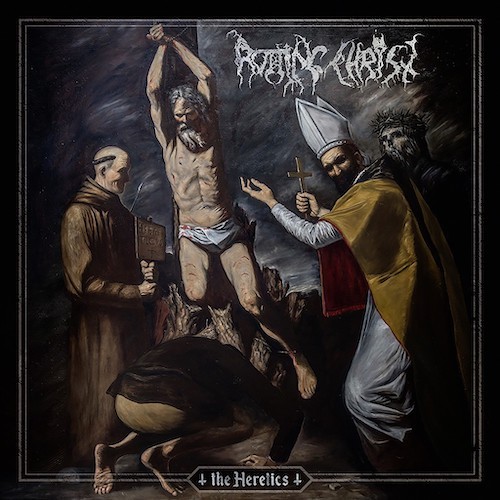
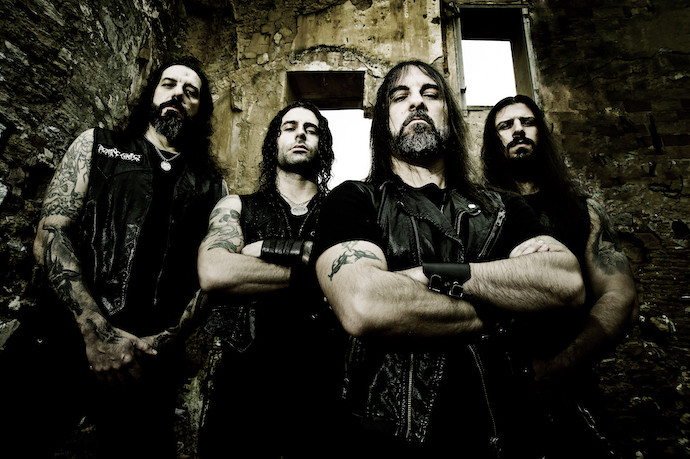
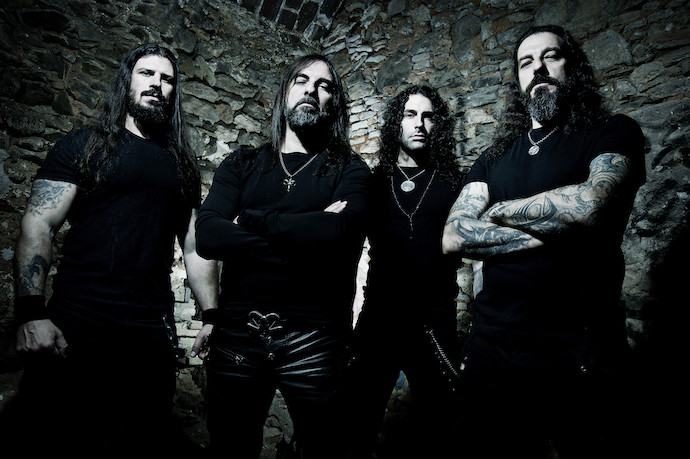
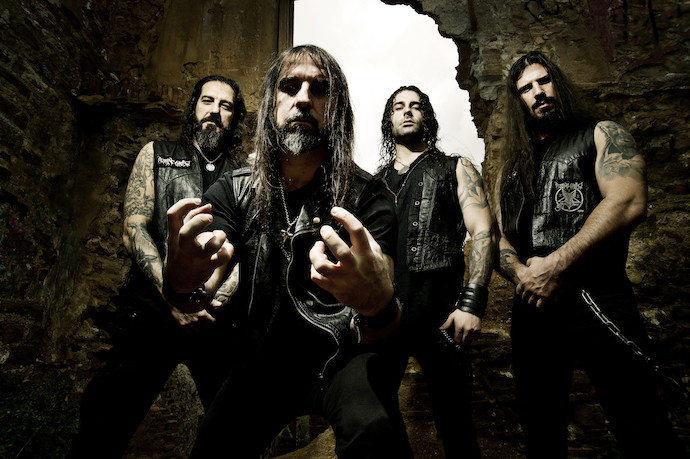
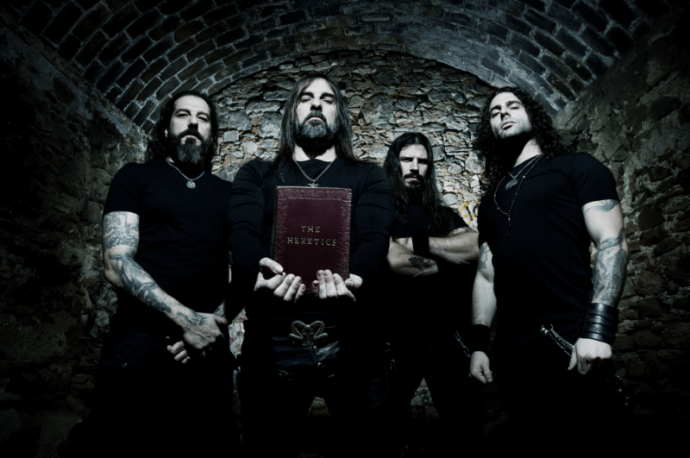
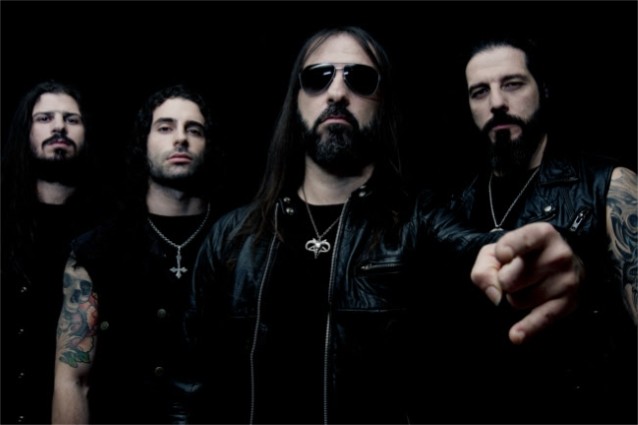
Oof, this is one of those times where I have to strongly disagree with one of my fellow writers.
This album is the equivalent of Rotting Christ aiming squarely for the least exciting, most middle-of-the-road version of their sound possible. You’ve heard every riff, every rhythm, every melody, and every lyric several times before on all their previous albums. I’m not sure there’s a word stronger than “formulaic” to describe the album as a whole but, if there is, then… it’s that. And then some.
The amount of shameless ego stroking and blind praise I’ve seen thrown at this record (including the word “masterpiece”, which I’m honestly suggesting we retire from the lexicon now as apaprently it’s lost all meaning) is almost inexplicable, until you realise that people like what they’e heard before – and there’s nothing here they haven’t heard before – are generally simply afraid to say, or even think, anything bad about “the big names” in Metal.
Sorry DGR, but this is just one boring slab of disappointment.
Something is draining all the joy out of your life. Please seek medical attention immediately.
Let’s not pretend that you’re not the reason why I’m a dessicated husk of a human being now.
My defense is that the desiccation was consensual.
It may be nothing really “new” for Rotting Christ, but this is a truly great, enjoyable album nevertheless. The more I listen to it, the more I understand it and like it. The only actual complaint I can make is that the best song of the album (“Sons Of Hell, pt.1”) is used as a “bonus track” to the digiipack CD edition, and is not included in the actual album itself.
Can’t take this review seriously, sorry. This “album” is total crap. Period. Be honest, please.
That’s out of line. It’s possible for someone to like an album that you think is crap, and to say so, without being dishonest. And since I happen to know the writer pretty well, there’s zero chance he’ll say something in a review that he doesn’t genuinely mean.
Yeah, as much as I strongly disagree with DGR’s assessment (and you know it pains me to do so) to assert that he’s being dishonest or has some kind of agenda… just makes John here sound like a dick.
I mean, DGR may be completely and utterly wrong, but I’ll defend to the death his right to be wrong!
With all due respect to the previous posters, the following paragraph captures the essence of this album pretty accurately for me:
“If you’re the type who is constantly on the hunt for the next big thing to push the genre forward, then The Heretics likely won’t find much traction. Where it will find traction is if you’re just hunting for another ten songs (to go alongside the three or four the group put out prior to this release on the various compilations they were involved with, like they have never taken a breather when it comes to writing) of this band rumbling through their various anti-religious screeds coupled with their knack for catchy-as-all-hell guitar writing.”
I think too often we presume that the ultimate goal of composition in metal music is to “push genre boundaries,” whereas the “formulaic” approach as Andy points out above seems to be a more pragmatic and real-life goal. I think both the proponents and opponents of the above views can find support for their views in this review.
At the risk of somehow agreeing with everybody here, I think you raise a good point.
As a dedicated fan of Rotting Christ, I’m loving this album – even though I know they’re coasting. They’re so good at producing this stuff that I just lap it up, even though part of my brain is continually telling me that they can do more than this. I feel that after Theogonia, RC basically accepted that couldn’t do any more to move ahead within the normal parameters of melodic black metal, and chose to seek alternative elements to incorporate. This has given them a wider overall scope, but with a simplified core which saddens me.
As a metal fan, I want bands to push boundaries – not all bands, perhaps, but certainly those that have given me that glorious buzz in the past. Metal is a still-expanding genre, and I always listen to new music with the anticipation that it may show me new facets. By contrast, I also love reggae, a genre that has lain stagnant since about 1990; I don’t anticipate genre-expansion from reggae albums, and thus I am never disappointed when I fail to get it.
To me, RC have a kind of segmented discography, with sequences of similar albums: [ Thy Mighty Contract – Non Serviam ], [ Triarchy… – Sleep of the Angels ], [ Khronos – Theogonia ], [ Aealo – now ]. Personally, I am more than ready for them to break out of the current sequence and start something else, but I realise that may not occur, and I’d prefer that they keep doing what they’re doing with conviction than give it up entirely.